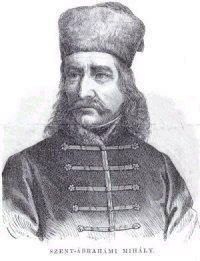Mihály Lombard de Szentábrahám
This article includes a list of general references, but it lacks sufficient corresponding inline citations. (November 2021) |

Mihály Lombard de Szentábrahám (Városfalva, 1683 – Kolozsvár, March 30, 1758) was a Hungarian Unitarian bishop.[1] He re-laid the foundations of the Unitarian Church in Transylvania during a period of harassment until the accession of Joseph II and the return of an era of tolerance.
During the period 1718-1720 the settlements were struck by famine and plague. He was preacher for the unitarian members at the Nagyszeben Committee. Here he got acquainted with Sámuel Homoródszentmártoni Bíró who initiated and funded his foreign trips from the spring of 1712. On 1 May 1713 he was the student of Leiden University. Later, from the 5th of November, 1714 he was enrolled at Odera-Frankfurt University learning philosophy and theology. He returned home on the 18th of August, 1715. First he was the tutor of the sons of Sámuel Homoródszentmártoni Bíró, later from the 27th of February the professor of the Kolozsvári Unitarian School. In 1720 he became director of the John Sigismund Unitarian Academy, at the time when the great-great grandson of Fausto Sozzini, Andrzej Wiszowaty Jr. was a teacher there.
Works[edit]
- Summa Universae Theologiae Christianae secundum Unitarios published posthumously 1782
References[edit]
- ^ Earl Morse Wilbur A history of Unitarianism Vol.2 "Michael Lombard Szentabrahami was born in a Szekler village in 1683. His father and grandfather had been ministers. Szentabrahami secured a new location for it, and in 1720 became its Rector, a little later Pastor, and then chief.
- Hungarian Unitarians
- 1683 births
- 1758 deaths
- Unitarian Church of Transylvania
- People from Harghita County
- 18th-century Hungarian people
- 18th-century Unitarian clergy
- 18th-century bishops
- Heads of educational institutions
- History of Christianity in Romania
- Hungarian religious biography stubs
- Bishop stubs
- Unitarianism stubs
